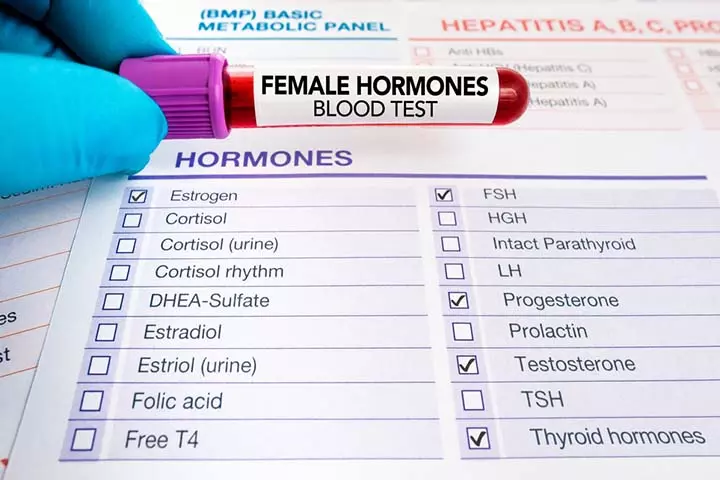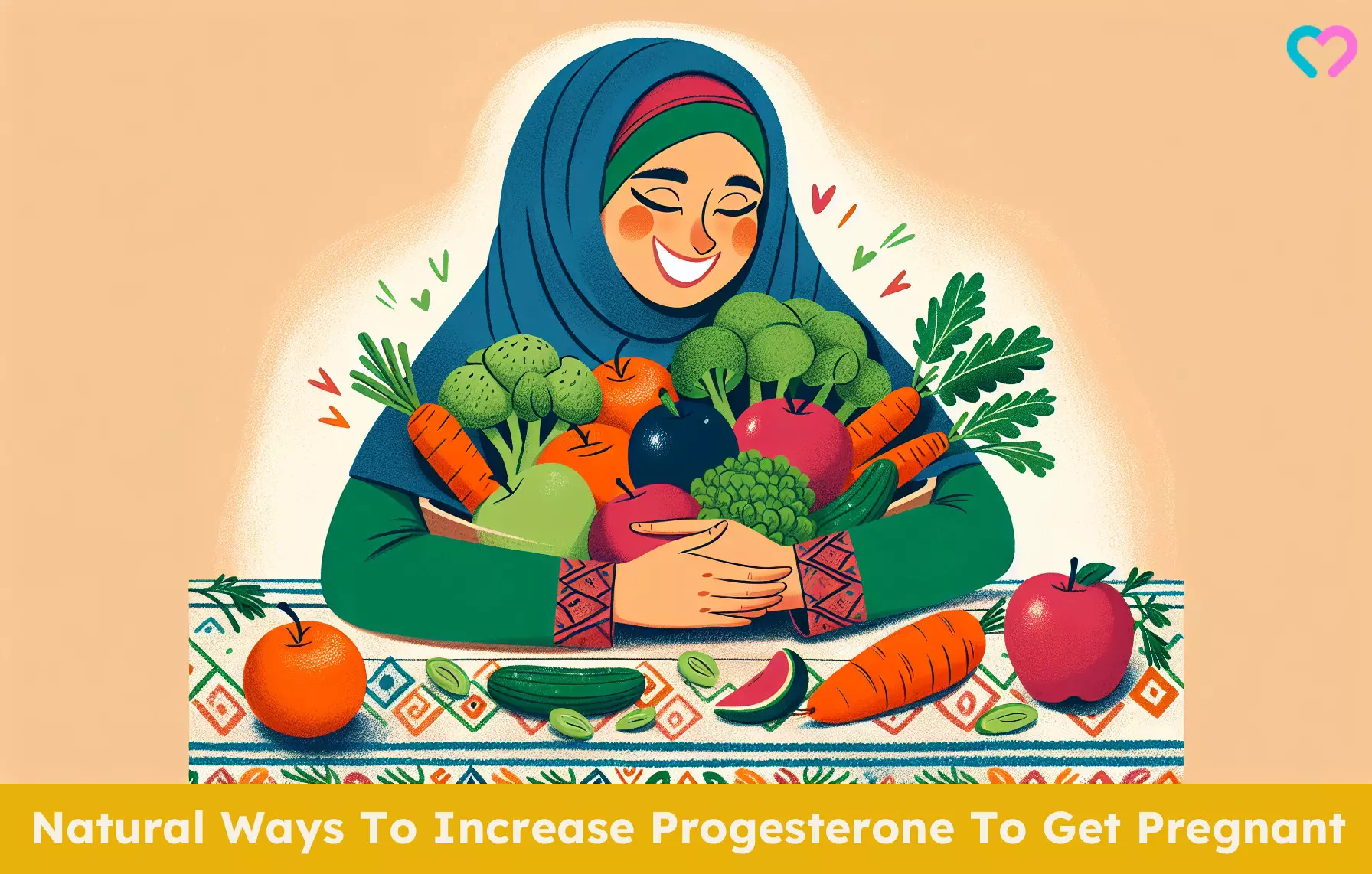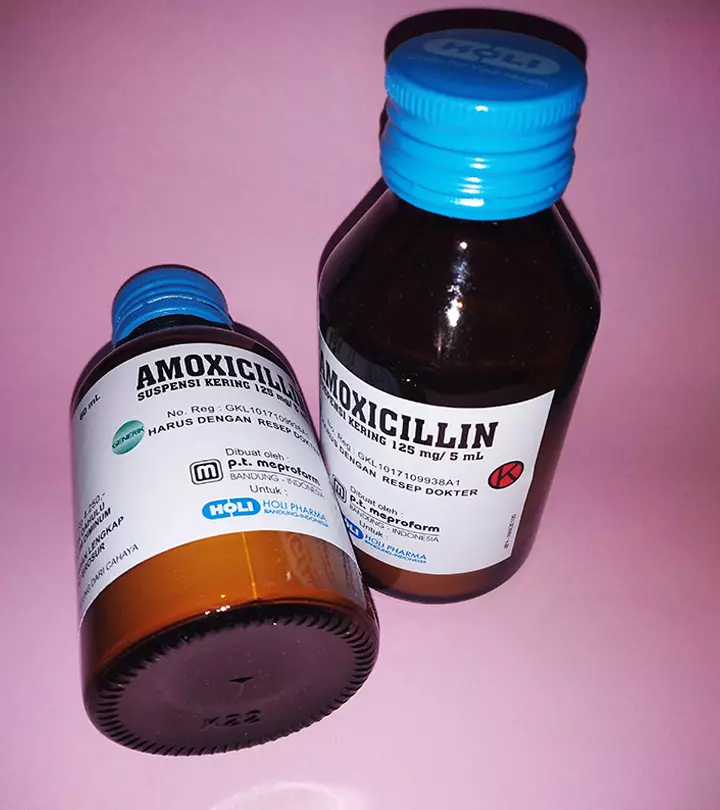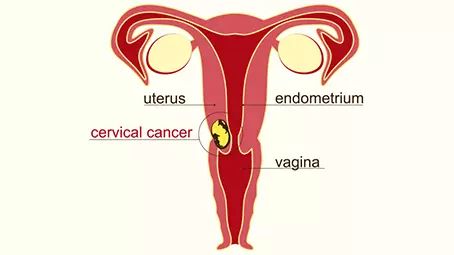
Image: iStock
Women can increase progesterone to get pregnant since this hormone enhances fertility and helps to sustain the pregnancy. According to the Centers For Disease Control and Prevention (CDC), about 19% of women aged between 15 and 49 struggle with infertility. Hormonal imbalances, such as lower hormone levels, can be a reason for infertility in many women. Progesterone is a pregnancy hormone; increasing its level can increase your chances of getting pregnant and having a successful pregnancy. Some doctors also prescribe progesterone in infertility treatments.

Read on to know the natural ways to increase progesterone to get pregnant and the importance of enhancing fertility.
Key Pointers
- Aging, excess estrogen, stress, and over-exercise can lower progesterone levels in a woman’s body.
- Progesterone prepares the uterine wall for implantation, and low progesterone levels can lead to failure of implantations and fertility issues.
- Maintaining a healthy weight, balanced diet with micronutrients, reducing stress, and avoiding over-exercise may help to improve progesterone levels in the body.
Why Is Progesterone So Important For Fertility?

“What is the role of progesterone during pregnancy and how can I increase it naturally?” is a common question women trying to conceive ask. Well, this female sex hormone controls menstruation and fertility and plays a vital role in initiating and maintaining pregnancy. The corpus luteum, a temporary hormone-secreting gland formed from an ovarian follicle, produces this hormone post ovulation and prepares the uterus lining (thickens it) after fertilization (conception) for implantation of the fertilized egg (1).
If you conceive, the hormone activates further and helps develop blood vessels in the lining to supply nutrients to the fetus. If you don’t get pregnant, the level of progesterone drops, and it initiates the menstrual cycle.
The levels of progesterone in the body go down when there is an increase in the levels of estrogen, the primary female sex hormone that develops female sexual characteristics, regulates progesterone, and protects the pregnancy (2).
While the exact cause for this is not known, there are some theories surrounding low levels of progesterone in women. Keep reading to know more.
What Are The Reasons For Low Progesterone?
There is not enough evidence to explain the causes of low progesterone levels in women. However, researchers believe it could be due to one of the following reasons (3):
- Excessive exercise for prolonged periods could be responsible for a reduction in your progesterone levels.
- Too much stress could result in hormonal imbalance. It increases the level of cortisol hormone (stress hormone) and lowers the progesterone levels in your body. This could be one of the reasons for miscarriage too (4).

- Exposure to xenoestrogensiGroup of synthetic compounds (endocrine disruptors) that mimic the structure of native estrogens (female hormones) (found in plastics, herbicides, pesticides, hydrogenated oils, margarine, etc.) could decrease the progesterone levels in the body (5).
- Excess body weight leads to increased estrogen levels, thereby bringing down progesterone. Therefore, being overweight often hampers your ability to conceive.
- Older women or women around 50 years could produce decreased progesterone due to menopauseiTermination of a woman’s menstrual cycle in a woman due to a decrease in reproductive hormones (6).
- Polycystic ovarian syndrome (PCOS) is a hormonal imbalance in women of reproductive age that causes a disrupted menstrual cycle and ovulatory phase. This condition also affects progesterone production, leading to its decreased levels in the body (7).
- Hypothyroidism is a condition when women have underactive thyroid functioning, making it challenging for their bodies to produce progesterone hormones (7).
- Estrogen dominance is characterized by the overproduction of estrogen, alterations to its metabolism and excretion, or an imbalance in the estrogen-to-progesterone ratio. Several disorders and conditions, including endometriosis, fibroids, and PCOS, can cause this condition, which ultimately leads to progesterone deficiency (8).
Low levels of this pregnancy hormone could affect your body in several ways. Find out how next.
How Does Low Progesterone Affect Pregnancy?
The primary function of progesterone in women is the thickening of the uterus.
When your progesterone levels are low, the chances of implantation of the fertilized egg are low, thus reducing your chances of getting pregnant.
If you have not been conceiving in spite of taking all the measures, then watch out for these signs of low progesterone:
- MigrainesiA severe intermittent headache often triggered by certain factors such as stress, or exposure to bright light or loud noises
- Headaches
- Depression
- Lack of sleep

- Mood swings
- Constipation
- Fatigue
- Breast tenderness
A few home care tips can help you keep your progesterone levels up and bring these symptoms down.
 Quick fact
Quick factHow To Increase Progesterone Naturally To Get Pregnant?
Instead of taking oral medications or treatments, you can try a few natural remedies to increase the progesterone levels in your body. Do check with your doctor before trying them.
- Avoid excessive exercise: If you indulge in strenuous workouts for prolonged periods, your body will secrete more cortisol or stress hormone than progesterone. So, it is best to stick to a moderate exercise routine, ideally four days a week and for about 30 to 60 minutes a day.
- Maintain a healthy weight: An increase in weight causes imbalance in hormones. It increases estrogen levels and decreases progesterone levels. So try to keep your weight in check if you’re planning to get pregnant (8).
- Reduce stress levels: Prolonged psychological stress makes the body release cortisol or stress hormone to manage stress. As mentioned before, this results in a reduced amount of progesterone in the body. So try and manage stress the right way to maintain a balance in hormones (9).
- Focus on the diet: Certain foods don’t contain progesterone, but they could help in regulating the levels of the hormone. These include:
- Zinc: It plays a vital role in the reproduction cycle, prompting ovaries to release progesterone. Some foods rich in zinc are chickpeas, pumpkin, red meat, and almonds (10).
- Omega 3: Food with omega 3 acids balances the hormone levels. Foods that enhance progesterone levels are eggs, walnuts, flaxseed, milk, and fish such as tuna, mackerel, and salmon (11).
- Vitamins: Food rich in vitamin B6, C, and E have shown an increase in progesterone levels (12) (13) (14). Foods rich in these nutrients include chicken, egg, soybeans, oatmeal, brown rice, broccoli, potato, Brussels sprouts, wheat germ, and plant oils such as olive and soy oils (15).

- Cholesterol: It is required to make essential hormones such as progesterone. Nuts (hazelnuts, almonds, pecans), olive oil, fatty fish (sardines, salmon, mackerel), oats, and beans are good sources (16)(17).
- Fiber: Consumption of fiber is good for the reproductive cycle, as it helps to improve the progesterone levels. Amaranth, flax seeds, and quinoa are some of the rich sources of fiber.
 Quick fact
Quick factFrequently Asked Questions
1. Does taking progesterone increase my chances of pregnancy?
All women wanting to conceive need progesterone to help their uterus prepare for and sustain a pregnancy (18). A study by the National Library of Medicine states that taking progesterone supplementation increases the chances of clinical pregnancy (19).
2. What should be the progesterone level to get pregnant?
The midluteal progesterone levels in women planning pregnancy should be more than 10 ng/mL (20).
3. How high should progesterone be for implantation?
The optimal progesterone levels for successful implantation can vary among individuals. However, a general acceptable range of 10-44 ng/mL is considered appropriate for early weeks of pregnancy (21).
4. Can too much progesterone prevent implantation?
A small-scale study suggests that excessive progesterone levels may interfere with the implantation process in IVF cycles. However, further studies are needed to confirm this correlation in both IVF and natural conception processes (22).
5. When should I start taking progesterone to prevent miscarriage?
The recommended timing to start taking progesterone to prevent miscarriage is typically up until 16 weeks of pregnancy. However, studies have demonstrated that the beneficial effects of progesterone are significant by 12 weeks of pregnancy (23).
6. Does progesterone help hCG increase?
No, according to a study, progesterone could suppress the secretion of hCG in a dose-dependent manner (24).
7. Are there any risks or side effects associated with using progesterone supplements or medications to increase fertility?
Progesterone supplements and medications used to increase fertility may have certain risks and adverse effects. These can include mood fluctuations, headache, shortness of breath, vomiting, diarrhea, breast soreness, constipation, and vaginal discharge (25).
You may try to naturally increase your progesterone levels to get pregnant since it plays a key role in fertility and the continuation of pregnancy. Maintaining a healthy weight and taking vitamins and zinc supplements can enhance your progesterone levels. Further, avoid too much exercise and stress to boost the progesterone levels in your body. Avoiding exposure to xenoestrogens found in plastics, hydrogenated oils, herbicides, and pesticides can also help. In addition, you could take progesterone supplements during pregnancy if your healthcare provider recommends it.
Infographic: How To Increase Progesterone Levels In Women?
If you’re trying to get pregnant, but failing to do so, low progesterone levels could be a possible cause. While there are several medications and treatments available to increase progesterone levels, the infographic below explains some simple home care and dietary tips. Take a look!
Some thing wrong with infographic shortcode. please verify shortcode syntaxIllustration: Natural Ways To Increase Progesterone To Get Pregnant

Image: Dall·E/MomJunction Design Team
Progesterone plays an essential role in conception and pregnancy. Watch this video to understand the importance of progesterone.
References
1. A. Czyzyk et al.; The role of progesterone therapy in early pregnancy: from physiological role to therapeutic utility; Journal Gynecology Endocrinology; 2017 volume 33
2. Progesterone; You and your hormones; Society for Endocrinology
3. M. Aucoin and A. Weber; Improved progesterone levels and pregnancy following Vitex agnus-castus (chaste tree) supplementation in a case of recurrent pregnancy loss: A case report; Australian Journal of Herbal and Naturopathic Medicine (2018)
4. P. A. Nepomnaschy et al.; Cortisol levels and very early pregnancy loss in humans; Proceedings of the National Academy of Sciences of the United States of America (2006)
5. T. S. Aldad, N. Rahmani, C. Leranth, and H. S. Taylor; Bisphenol-A (BPA) Exposure Alters Endometrial Progesterone Receptor Expression in the Non-human Primate; Fertility & Sterility: American Society for Reproductive Medicine (2011)
6. Hormones as you age: Health and wellness; Rush University Medical Center
7. Low Progesterone; Cleveland Clinic
8. A. Kolan; Estrogen Dominance Clinical Tool; Whole Health: Change the conversation
9. J. R. Roney and Z. L. Simmons; Elevated Psychological Stress Predicts Reduced Estradiol Concentrations in Young Women; Adaptive Human Behavior and Physiology (2015)
10.Zinc: Fact Sheet for health professionals; National Institutes of Health
11. Omega-3 fatty acids: Fact Sheet for health professionals; National Institutes of Health
12. GE Abraham; Nutritional factors in the etiology of the premenstrual tension syndromes; The Journal of Reproductive Medicine (1983)
13. H. Henmi et al.; Effects of ascorbic acid supplementation on serum progesterone levels in patients with a luteal phase defect; Fertility and Sterility: American Society for Reproductive Medicine (2003)
14. A. Takasaki et al.; Luteal blood flow and luteal function; Journal of Ovarian Research (2009)
15.Vitamins and minerals; NHS
16. Pregnancy and blood fats; Heart UK
17. Z. Xu, S. T. McClure, and L. J. Apple; Dietary Cholesterol Intake and Sources among U.S Adults: Results from National Health and Nutrition Examination Surveys (NHANES), 2001–2014; Nutrients (2018)
18. Progesterone and Pregnancy: A Vital Connection; RESOLVE
19. Sonia Elguero et al.; Does progesterone supplementation improve pregnancy rates in clomiphene citrate and intrauterine insemination treatment cycles?; National Library of Medicine (2015)
20. Progesterone Blood Level; ScienceDirect
21. Progesterone;University of Rochester Medical Center
22. Xiong, Yujing et al.; Effects of high progesterone in in-vitro fertilization cycle on DNA methylation and gene expression of adhesion molecules on endometrium during implantation window(2025); NCBI
23. Duncan, W Colin.; Did the NICE guideline for progesterone treatment of threatened miscarriage get it right? (2025)
24. Wilson, E A et al.; Effect of estradiol and progesterone on human chorionic gonadotropin secretion in vitro (1984)
25. Progesterone; MedLine Plus
26. Reproductive Hormones; Endocrine Society
27. K. P. Sampath Kumar, et al.;Traditional and Medicinal Uses of Banana; Journal of Pharmacognosy and Phytochemistry
Community Experiences
Join the conversation and become a part of our nurturing community! Share your stories, experiences, and insights to connect with fellow parents.
Read full bio of Dr. Asmita Kaundal
Read full bio of Dr Bisny T. Joseph
Read full bio of Rebecca Malachi
Read full bio of Reshmi Das
















